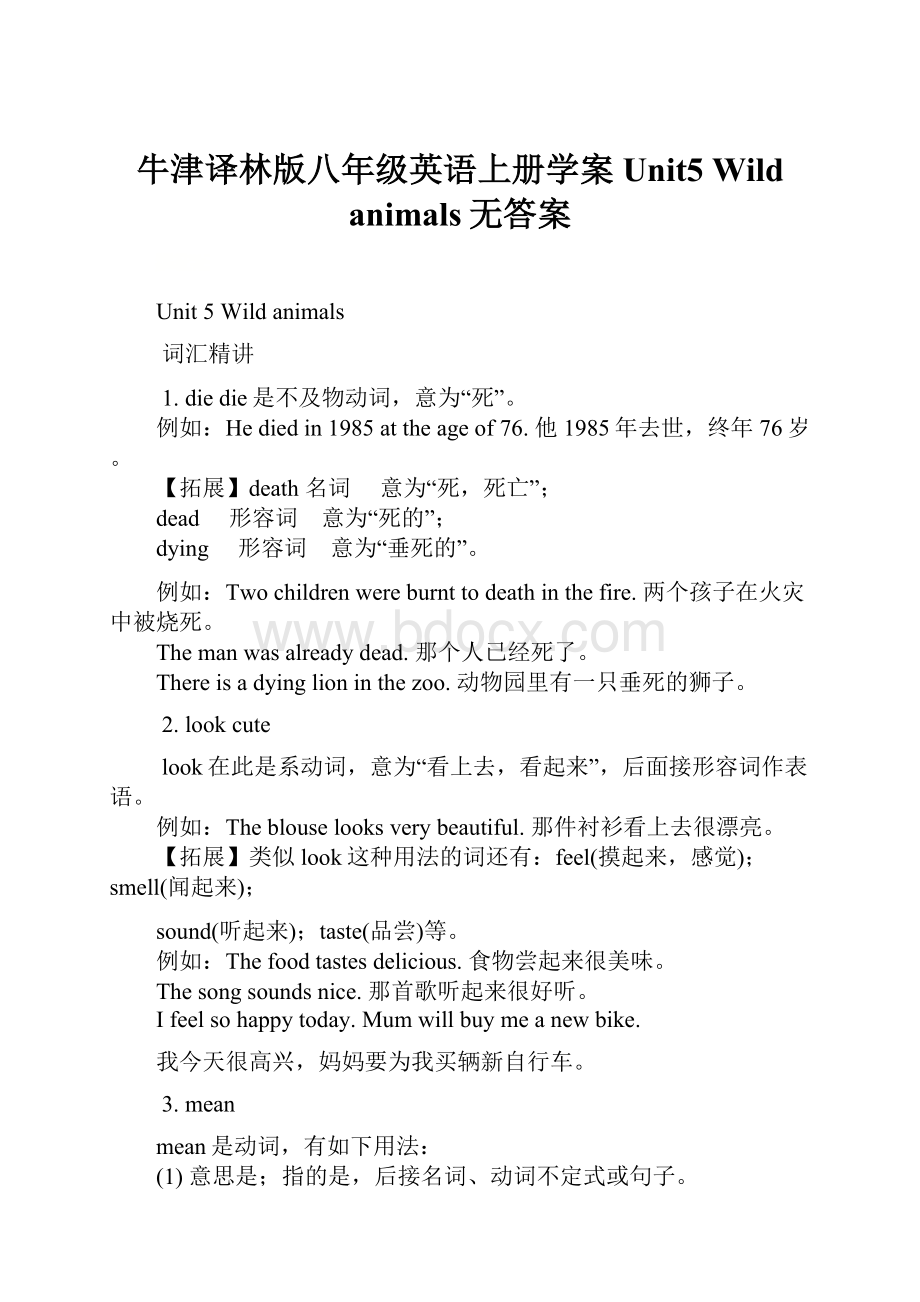牛津译林版八年级英语上册学案Unit5 Wild animals无答案.docx
《牛津译林版八年级英语上册学案Unit5 Wild animals无答案.docx》由会员分享,可在线阅读,更多相关《牛津译林版八年级英语上册学案Unit5 Wild animals无答案.docx(18页珍藏版)》请在冰豆网上搜索。

牛津译林版八年级英语上册学案Unit5Wildanimals无答案
Unit5Wildanimals
词汇精讲
1.diedie是不及物动词,意为“死”。
例如:
Hediedin1985attheageof76.他1985年去世,终年76岁。
【拓展】death名词 意为“死,死亡”;
dead 形容词 意为“死的”;
dying 形容词 意为“垂死的”。
例如:
Twochildrenwereburnttodeathinthefire.两个孩子在火灾中被烧死。
Themanwasalreadydead.那个人已经死了。
Thereisadyinglioninthezoo.动物园里有一只垂死的狮子。
2.lookcute
look在此是系动词,意为“看上去,看起来”,后面接形容词作表语。
例如:
Theblouselooksverybeautiful.那件衬衫看上去很漂亮。
【拓展】类似look这种用法的词还有:
feel(摸起来,感觉);smell(闻起来);
sound(听起来);taste(品尝)等。
例如:
Thefoodtastesdelicious.食物尝起来很美味。
Thesongsoundsnice.那首歌听起来很好听。
Ifeelsohappytoday.Mumwillbuymeanewbike.
我今天很高兴,妈妈要为我买辆新自行车。
3.mean
mean是动词,有如下用法:
(1)意思是;指的是,后接名词、动词不定式或句子。
例如:
Theredlightmeans“stop”.红灯意思是“停止”。
DoyoumeanthatIamtooheavy?
你的意思是我太胖了?
(2)打算,意欲,后面常接不定式。
例如:
Hemeanstodoitwell.他打算把这件事做好。
(3)意味着……,后面常接动名词作宾语。
例如:
Missingthetrainmeanswaitingforanhour.赶不上这列火车意味着再等一小时。
(4)Whatdoes…mean?
=What’sthemeaningof…?
=Whatdoyoumeanby…?
意为“……是什么意思?
”
例如:
What’sthemeaningofthisword?
=Whatdoesthiswordmean?
这个单词是什么意思?
4.closed
(1)closed是形容词,意为“关闭的”,其反义词为open意为“开着的”。
例如:
Makesureallthewindowsareclosed.确保要把所有的窗户都关好。
(2)closed作形容词,还可意为“关门的;不开放的”。
例如:
TheshopshereareclosedonSundays.这里的商店星期天关门。
【拓展】
(1)close是动词,意为“关上,闭上”。
例如:
Pleaseclosethedoor. 请关上门。
(2)close还可作形容词,意为“亲密的”。
例如:
closefriends密友 aclosegame势均力敌的比赛
5.none
none意为“没有,都不”,表示全部否定,可指人或物,常与of连用,后接可数名词时,
谓语动词用单、复数形式均可,接不可数名词时,谓语动词只能用单数形式。
常回答howmany/much的问句。
例如:
—Howmanystudentsarethereintheclassroom?
教室里有多少学生?
—None.一个也没有。
Noneofuslikesher.我们当中没有一个人喜欢她。
【拓展】
(1)noone=nobody意为“没有人”,单独作主语,其谓语动词用单数形式,其后
不能接of…结构。
在简略回答中,回答who的问句。
例如:
—Whoisintheroom?
谁在房间里?
—Noone.没有人。
Nobodywillmakefriendswithhim.没有人愿意与他交朋友。
(2)nothing意为“没有什么,没有东西”,只能指物,常用来回答What’sin…?
例如:
—What’sinthebox?
箱子里有什么?
—Nothing.什么都没有。
6.anythingspecial
anythingspecial意为“一些特殊的事情”,形容词special作后置定语修饰不定代词
anything。
形容词修饰不定代词,常放在不定代词之后,即形容词作不定代词的后置定语。
例如:
Doyouhaveanythingimportanttotellme?
你有什么重要的事情要告诉我吗?
Didhehearanythinginterestingoutsidetoday?
他今天在外边听到了一些有趣的事了吗?
【拓展】
(1)不定代词作主语时,相当于第三人称单数。
例如:
Somethingiswrong.某东西有问题。
(2)常见的不定代词还有:
anything;nothing;somebody;someone;anybody;nobody;noone等。
Thereisnothingnewintoday’snewspaper.今天的报纸上没有什么新鲜事。
7.rightaway
rightaway意为“立刻,马上”,相当于atonce,rightnow,inaminute/moment,
在句中作状语,多用于将来时中。
例如:
Let’sbeginrightaway.咱们马上开始吧!
【拓展】just;justnow;rightnow和rightaway的辨析:
(1)just表示“刚刚”,常用于现在完成时,位于助动词与实义动词之间。
例如:
Mr.GreenhasjustleftforParis.格林先生刚刚到巴黎去了。
(2)justnow意为“刚才”,表示过去的时间,用于一般过去时中。
例如:
Whatdidyousayjustnow?
你刚才说什么来着?
(3)rightnow有两个意思:
一种为“立刻;马上”,相当于rightaway,常用于一般
将来时中;另外一种为“此刻;目前”,相当于atthemoment,常用于现在进行时或一般将来时。
例如:
I’llcleantheroomrightnow.我马上打扫房间。
Iammendingmybikerightnow.此刻我正在修理自行车。
8.save
(1)save是动词,意为“储存”。
例如:
Savesomefoodforme.给我留点吃的。
We’lleatsomenowandsavesomefortomorrow.我们现在吃一些,留一些明天吃。
(2)save还可意为“保存、挽救、节省”等意思。
例如:
Howdoyousavethedocument?
你如何保存这个文件?
(保存)
Theboysavesmoneytobuyapen.那个男孩攒钱买钢笔。
(存储,节省)
Thepolicesavedthegirl’slife.警察救了那个女孩的命。
(拯救)
9.accept
accept是动词,意为“接受,收受”。
例如:
Sheacceptedhisflowershappily.她高兴地接受了他的花。
【拓展】receive和accept的辨析:
(1)receive和accept都有“接收”的意思。
receive表示客观上收到,而accept表示主观上接受。
Ireceivedhisinvitationbutdidnotacceptit.
我收到了他的请帖,但并没有接受他的邀请。
(2)receive通常指被动地“收到”或“接到”,而accept则指主动地“接受”。
Wehaven’treceivedhisletterforalongtime.我们很久没有收到他的来信了。
Sheofferedhimaliftandheaccepted(it).她请他坐她的车,他接受了。
(3)表示“接见、接待”时,要用receive而不用accept。
Shewaswarmlyreceived.她受到热情接待。
词汇精练
I.英汉互译。
1.事实上_______________ 2.出生_______________
3.not…anymore_______________ 4.whynot_______________
5.asaresult_______________ 6.害怕某人/某物_______________
7.somethingspecial_______________ 8.rightaway_______________
9.takeaction_______________ 10.以食……为生_______________
II.根据句意及所给汉语或首字母提示完成单词。
1.Didyouhearthe____________(报告)onthefutureofourschool?
2.Ifgiantpandasarein____________(危险),theywillattackpeople.
3.Howmany____________(狼)arethereintheforest?
4.Weshouldbuildmorewildanimalr____________tohelpthemtolive.
5.H____________catchtigersfortheirfur,bonesorotherpartsofthebody.
6.Ididn’tgotoschooltodaybecauseofi____________.
7.Theyhavethreed____________fordinnerattherestaurant.
8.Thesupermarketis____________(关门)after9o’clock.
9.Therewast____________foginourcitythisspring.
10.Whatas____________wemissedthewedding.
句式精讲
1.whynot?
Whynot?
意为“为什么不”,询问被否定的原因。
例如:
—Youcan’tgotherealone.你不能单独去那里。
—Whynot?
为什么不呢?
【拓展】
(1)whynot用在口语中表示赞同,意为“当然,好啊”。
例如:
—Let’sgotothemovies.我们看电影吧。
—Whynot?
好啊!
(2)“Whynot+动词原形+其他?
”相当于“Whydon’tyou+动词原形+其他?
”
并不表示疑问,而是作建议、询问。
例如:
—Whynotplayfootballwithus?
为什么不和我们去踢足球呢?
—Thatsoundslikeagoodidea.这是个好主意。
2.Shewasnotasmallbabyanymore…
not…anymore意为“不再”。
not常位于be动词、情态动词或助动词之后,anymore
常位于句末相当于nomore。
nomore常位于句中,放在be动词之后,实义动词之前,
两者经常可以互换。
例如:
Hedoesn’tlivehereanymore.=Henomoreliveshere.他不再住在这里了。
【拓展】
表示“不再”的词还有not…anylonger或nolonger。
二者的区别在于:
(1)not…anymore=nomore,表示数量或程度上的“不再”增加,通常修饰终止性动词。
例如:
Thebabyisn’tcryinganymore.=Thebabyisnomorecrying.这个婴儿不再哭了。
(2)nolonger=not…anylonger表示时间或距离上的“不再”延长,通常修饰延续性的动词。
例如:
Ican’tstanditanylonger.我对此再也不能忍受下去了。
3.…shelearnttolookafterherself.
learn是动词,意为“学,学会”,learntodosth.意为“学会做某事”。
例如:
WearelearningEnglish.我们正在学英语。
Heislearningtoswim.他正在学习游泳。
【拓展】
(1)learnfromsb意为“向某人学习”。
例如:
Wemustlearnfromeachother.我们应当彼此学习。
(2)learn…byoneself意为“自学”。
例如:
Shelearnsswimmingbyherself.她自学游泳。
(3)learnabout意为“学习,获得,学得,得知有关…的消息”。
例如:
ShecanlearnaboutChinesehistory.她能学习到中国历史方面的知识。
First,wemustlearnabouttheweatherhere.首先,我们必须了解这里的天气。
4.…theyforgetwheretofindthefood.
wheretofindthefood为“疑问词+动词不定式”结构,在句中可作主语、宾语或表语等。
例如:
Whentoleaveisstillaquestion.什么时候离开仍旧是一个问题。
(作主语)
Idon’tknowhowtouseit.我不知道怎么使用它。
(作宾语)
Theproblemiswhotohelpher.问题是谁去帮助她。
(作表语)
【拓展】
“疑问词+动词不定式”结构可以与主从复合句进行转换,即由简单句变成主从复合句或由
主从复合句变成简单句。
例如:
CanyoutellmehowIcangetthere?
(主从复合句)
=Canyoutellmehowtogetthere?
(简单句)你能告诉我怎样到那儿吗?
5.Itmayneedabath.
此句中may表示可能性。
关于may表可能性的用法,现总结如下:
(1)may可用来表示可能性,用在肯定句或否定句中,不用于疑问句中。
例如:
Imaybeafewminuteslate.我可能会晚到几分钟。
Itmaynotraintomorrow.明天可能不下雨。
(2)与can相比,may表示的可能性比can小。
may的否定式是maynot,
表示可能性时意为“可能不”。
例如:
Imaybelate,sodon’twaitforme.我可能会迟到,所以不必等我。
Youmayberightormaynotberight.你可能对也可能不对。
(3)may的过去式形式是might,might可以指过去的可能性,也可以指现在的可能性,
指现在的可能性时比may程度弱。
例如:
Hetoldmehemightbelate.他告诉我他可能会迟到。
Hemightcometomorrow,butIamnotquitesure.他明天可能来,但我不确定。
6.…thebambooforestsarebecomingsmallerandsmaller.
smallerandsmaller意为“越来越小”。
and连接同一个形容词或副词的比较级,
表示“越来越……”。
当形容词或副词是多音节或部分双音节的词时,则用
moreandmore+形容词/副词原级。
例如:
It’sgettingwarmerandwarmerinspring.春天天气变得越来越暖和。
Wewanttomakeourcountrymoreandmorebeautiful.我想让我们的国家变得越来越美丽。
Thecarranmoreandmoreslowly.汽车跑得越来越慢。
句式精练
I.根据汉语提示,完成英语句子(每空一词)。
1.你愿意来参加我的生日聚会吗?
________________________________________cometomybirthdayparty?
2.请你同情它们好吗?
Couldyouplease______________________________them?
3.他再也不来看望我了。
He__________visitme____________________.
4.如果我们什么也不做,大熊猫可能没有生存的地方。
______wedonothing,theremaybe____________forgiantpandas________________.
5.保护濒危动物对我们来说是重要的。
Itisimportant__________us____________________animals____________________.
6.你要保守秘密,否则这会使他不高兴。
Youshould____________________,orthiswillmakehim__________.
7.我们应该鼓励孩子们保护动物。
Weshould__________children____________________animals.
8.我们需要更多人来认识到湿地的重要性,并且采取措施来保护野生动物。
Weneedmorepeopletoknowthe______ofthewetlandsand______________toprotectwildanimals.
II.句型转换。
1.Theydon’tknowwheretheycanfindtheirfood.(改为简单句)
Theydon’tknow______________________________theirfood.
2.Weshouldtakeactionrightaway.(就划线部分提问)
____________________we__________rightaway?
3.Ilikezebrasbest.(就划线部分提问)
______________________________youlike__________?
4.Manywildanimalslosetheirlivesbecausehuntershuntthem.(改为同义句)
Manywildanimalslosetheirlives______________________________.
5.It’sagreatpity!
(改为同义句)
______________________________!
6.TolearnEnglishwellisdifficultforhim.(改为同义句)
____________________forhim____________________Englishwell.
7.Heforgetsthatheboughtabooklikethisone.(改为简单句)
Heforgets______________________________likethisone.
8.Youwilllearnaforeignlanguagewell.Youstudyhard.(用if连成一句)
_______________________________________________________
9.Ifyoudon’tcomehereearly,youwillmissthefirstbus.(改为祈使句)
____________________________________________________________
10.Themotherpandahadtwomorebabieslastweek.(改为同义句)
Themotherpandahad____________________babieslastweek.
巩固练习
I.单项选择。
1.Ithinkyouneed_______somebooksforyourstudy.
A.buys B.buying C.tobuy D.bought
2.Peterenjoyed_______athisbirthdaypartylastnight.
A.he B.him C.himself D.his
3.It_______Mr.Greenanhourtofixuphisbicycleyesterday.
A.cost B.paid C.spent D.took
4.Maggiewantedaneveningjobthatwouldallo